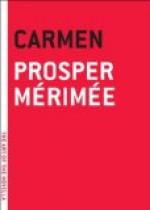Various considerations prevented me from going to claim it next day, or requesting the Corregidor to be good enough to have a search made for it. I finished my work on the Dominican manuscript, and went on to Seville. After several months spent wandering hither and thither in Andalusia, I wanted to get back to Madrid, and with that object I had to pass through Cordova. I had no intention of making any stay there, for I had taken a dislike to that fair city, and to the ladies who bathed in the Guadalquivir. Nevertheless, I had some visits to pay, and certain errands to do, which must detain me several days in the old capital of the Mussulman princes.
The moment I made my appearance in the Dominican convent, one of the monks, who had always shown the most lively interest in my inquiries as to the site of the battlefield of Munda, welcomed me with open arms, exclaiming:
“Praised be God! You are welcome! My dear friend. We all thought you were dead, and I myself have said many a pater and ave (not that I regret them!) for your soul. Then you weren’t murdered, after all? That you were robbed, we know!”
“What do you mean?” I asked, rather astonished.
“Oh, you know! That splendid repeater you used to strike in the library whenever we said it was time for us to go into church. Well, it has been found, and you’ll get it back.”
“Why,” I broke in, rather put out of countenance, “I lost it—”
“The rascal’s under lock and key, and as he was known to be a man who would shoot any Christian for the sake of a peseta, we were most dreadfully afraid he had killed you. I’ll go with you to the Corregidor, and he’ll give you back your fine watch. And after that, you won’t dare to say the law doesn’t do its work properly in Spain.”
“I assure you,” said I, “I’d far rather lose my watch than have to give evidence in court to hang a poor unlucky devil, and especially because—because——”
“Oh, you needn’t be alarmed! He’s thoroughly done for; they might hang him twice over. But when I say hang, I say wrong. Your thief is an Hidalgo. So he’s to be garrotted the day after to-morrow, without fail.* So you see one theft more or less won’t affect his position. Would to God he had done nothing but steal! But he has committed several murders, one more hideous than the other.”
* In 1830, the noble
class still enjoyed this privilege.
Nowadays, under the
constitutional regime, commoners have
attained the same dignity.
“What’s his name?”
“In this country he is only known as Jose Navarro, but he has another Basque name, which neither your nor I will ever be able to pronounce. By the way, the man is worth seeing, and you, who like to study the peculiar features of each country, shouldn’t lose this chance of noting how a rascal bids farewell to this world in Spain. He is in jail, and Father Martinez will take you to him.”




